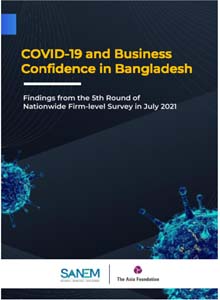COVID-19 and Business Confidence in Bangladesh: Findings from the 5th Round of Nationwide Firm-level Survey in July 2021
 Citation: Raihan, S., Uddin, M., Ahmed, M. T., & Hossain, I. (2021). COVID-19 and Business Confidence in Bangladesh: Findings from the 5th Round of Nationwide Firm-level Survey in July 2021. SANEM Publications, Dhaka, Bangladesh.
Citation: Raihan, S., Uddin, M., Ahmed, M. T., & Hossain, I. (2021). COVID-19 and Business Confidence in Bangladesh: Findings from the 5th Round of Nationwide Firm-level Survey in July 2021. SANEM Publications, Dhaka, Bangladesh.
Abstract: The COVID-19 pandemic with its numerous variants arising in different times has already proved that it is not going away from our life soon. In response to the COVID-19 upsurge, the Government of Bangladesh had to impose lockdowns at different periods which incurred many losses in the national economy. As it will be existing at different degrees across the world, the Government of Bangladesh needs to build up coping development strategies accordingly to survive in the new-normal situation. For that, monitoring the private sector closely is a necessity that can assess how effective the already-taken government measures are.
In this respect, this study convened a survey of 501 firms across the country (255 manufacturing; 246 services sector firms). Seven sub-sectors in the manufacturing industry and eight sub-sectors in the services industry were identified based on Bangladesh’s latest available National Accounts Statistics. The survey covers RMG, Textiles, Pharmaceuticals, Leather and Tannery, Light Engineering, Food Processing, etc. in the manufacturing sector. In the Services sector, this study covers Wholesales, Retailers, Restaurants, Transport, ICT and Telecommunication, Financial Sectors, Real Estate, etc. The number of firms to be surveyed for each of the sub-sectors was chosen based on the sub-sectors’ contribution to the GDP.
Based on the survey responses, this study constructs three indices, namely – (i) Present Business Status Index in April-June 2021 compared to January-March 2021, (ii) Present Business Status Index in April-June 2021 compared to April-June 2020, (iii) Business Confidence Index for July-September 2021 compared to April-June 2021. The indices are first prepared at the firm level and later aggregated to the sub-sectoral and sectoral level incorporating appropriate weights. There were six indicators for each index: Profitability, investment, employment, wage, business cost, and sales/export.
The PBSI (year) has improved over the quarters though it is lower than the 50 mark which indicates the overall under-developed business situation in the country. The improvement has also been visible in all indicators except the business cost. In comparison with each round PBSI (year), the fifth round has the highest average PBSI score. However, the current business activities as measured by PBSI (quarter) have deteriorated in April-June 2021 quarter compared to January-March 2021 quarter-this is primarily because of the second wave of the pandemic. This evidences the vulnerability of the national economy to face consecutive crises specifically in the micro, small, and medium business enterprises.
The improvement in the business confidence creates a hope to restore the private sector as the score of BCI in July-September 2021 has improved than that of in April-June 2021. The improvement is visible for all the sub-components of BCI. The business cost has always been a concern and it should be given more importance by improving the overall business environment facilitating the firms to produce at a lower cost. The stimulus package could be a key facilitator here and the GOB has already taken this measure. But the disbursement is not that effective since 65% of the surveyed firms are yet to receive it. The major challenges have been identified in the survey report as lack of package for the industry, lengthy procedure, difficulty in bank-related services, and difficulty in information.
The surveyed firms provided an opinion on the status of Bangladesh’s economic recovery since the emergence of the pandemic. 64% of respondents observe Bangladesh in a path of weak recovery, 27% consider it as moderate recovery, and only 9% opines it a strong recovery which is a little bit better than the previous round survey. Foreign remittances, export of goods and services, bank credit to the private sector, and vaccination programs amongst others are major factors that are contributing to the overall economic recovery. As a coping up strategy during April-June 2021, firms handle the situation by their savings (65.7% out of 501). The other major strategies are borrowing (28.1%), employee lay-off (19%), usage of stimulus (17.8%), and wage/salary cut (8.8%) amongst others.
Vaccination is the first and foremost measure to combat the COVID crisis. The reach of the government vaccination programme is yet to reach an efficient level. The survey finds that 60% of the respondent (employers) got at least one dose of vaccine. However, this finding is not homogenous across sector, location, firm size, and exporter amongst others. Also, on average 25.5% of firms’ total employees got at least one dose of the vaccine among which the Financial Sector, Pharmaceuticals, Textile are in the leading position. The rate is higher in Dhaka in comparison with other areas.

